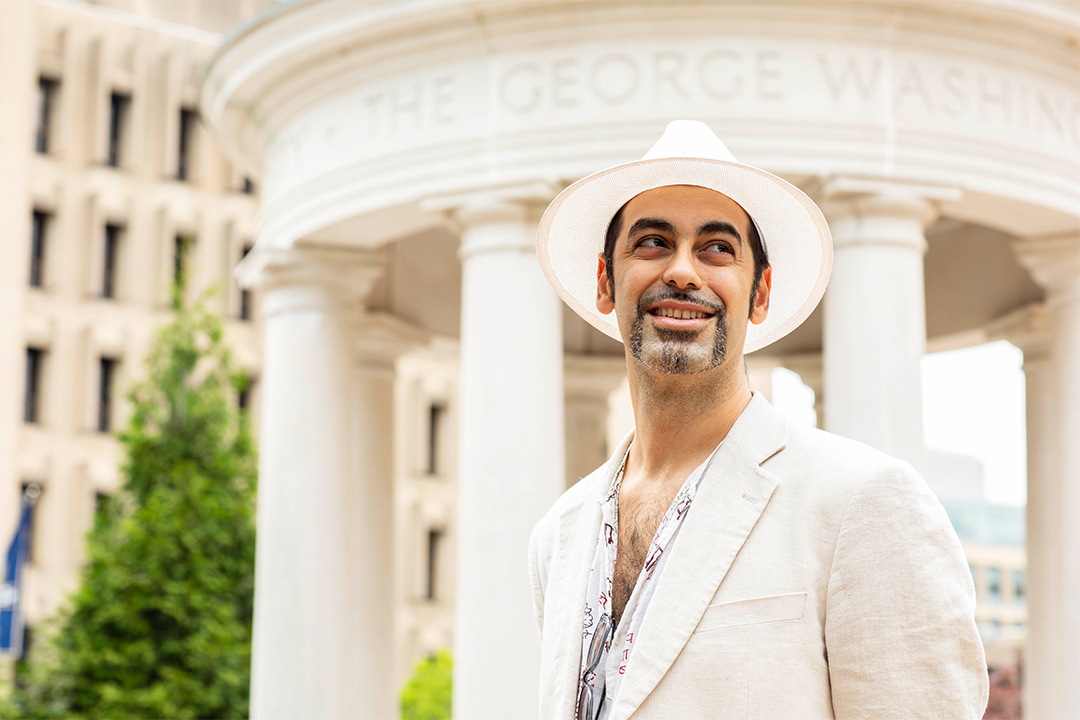Yahia Lababidi, BA ’96, doesn’t think of himself as a political person. An Egyptian-American writer who has published seven books of poetry, essays and aphorisms, he prefers waxing about Persian mystical poets and 6th century Chinese philosophy than modern laws and election results.
But times have changed since Lababidi immigrated to America shortly after he graduated from Columbian College with a major in English. Between travel bans and divisive rhetoric aimed at immigrants, Lababidi felt that he couldn't keep his voice on the political sidelines. And as a poet, his most effective weapon was his pen.
“I’m an apolitical creature, and I am not confrontational by nature,” said Lababidi, whose work has appeared on NPR, the PBS NewsHour and the Best American Poetry anthology. But in his new book Where Epics Fail (Unbound-Penguin Random House), the celebrated author addresses what he calls a “clotting of the arteries of America” with the pithiest of verses: aphorisms, an ancient art form that’s part poetry, part philosophy and often consists of just a single line. In the book, Lababidi strings together 800 maxims written over a 10 year period into his own message of acceptance. Alongside lines condemning intolerance—such as “The right to free speech ends where hate speech begins”—his verses also are meant to remind us of our shared humanity: “Take two opposites, connect the dots and you have a straight line,” he writes.
In a sense, Lababidi sees his collection as a “peace offering,” he explained, one that is particularly relevant to the time. To Lababidi, the “humble epigram” can be every bit as powerful as larger narratives.
Or, to quote one of his own aphorisms, “In the deep end, every stroke counts.”
Wit and Wisdom
Growing up in Cairo, the child of art-patron parents, Lababidi was surrounded by a literary salon of writers, poets and philosophers. At his family parties, he served drinks to Egyptian satirist Ahmed Ragab and playwright Yusuf Idris. His own talents were acquired “intravenously,” he jokes, from his grandfather, a celebrated Lebanese poet after whom he’s named. Still Lababidi didn’t aspire to be a writer in his youth. “I thought the idea of being in your room by yourself and writing was a punishment,” he said. “No way was I going down that route.”
Aphorisms were a form of literature he couldn’t escape. From the bustling Cairo bazaars to his grandmother’s kitchen, Lababidi was captivated by the Egyptian custom of passing on inherited wit and wisdom through proverb-like expressions. When warning him to mind his own business, his grandmother might extol Lababidi to “never get between an onion and its skin—you won’t get anything except its stink.” He'd overhear family friends bemoan an unfaithful spouse by declaring, “If you trust men, you trust water in a sieve.” And when reinforcing the importance of oral traditions, a teacher might explain, “Knowledge is what’s in your head. Not in your notebooks.”
It wasn’t until he came to GW that Lababidi took his own writing seriously. He fell under the sway of former English Professor Robert Ganz, whom Lababidi has described as “a free-spirit and independent thinker, whose classes I recall almost as a form of performance art in service to the life of the mind.” In addition to introducing Lababidi to Nietzsche and Wilde, Ganz, now a professor emeritus, encouraged him to mine his culture’s aphorisms for poetic insights. Following his guidance, Lababidi began jotting down verses on napkins and grocery store receipts, capturing “anything I thought was worth quoting from my soul’s dialogue with itself.”
While at GW, Lababidi also met Diana Restrepo, BBA ’95, a finance major whom he later married. As Lababidi honed his writing craft, the pair would spend silent hours reading. “I was sort of a solitary, introverted bird but she let me materialize into whatever I needed to be,” he said. “I began to think that here was someone whose air I can breath.”
‘Modern Day Master’
Lababidi’s aphorisms have been featured in volumes alongside Voltaire, Shakespeare and Emily Dickinson. President Obama’s inaugural poet, Richard Blanco, called him the “modern-day master” of the art form. And Lababidi himself believes the verses are perfectly suited to today’s 140-character culture. “Twitter has made aphorists of us all,” he said.
Still, he never planned his new book of aphorisms to be overtly political. As the divisiveness over immigration ignited passions and tempers—culminating in the Supreme Court upholding President Trump’s travel ban—Lababidi found ugly incidents creeping into his own life. From his Fort Lauderdale home, he was fielding questions about whether all Muslims were terrorists or if it was even possible to be a moderate Muslim. In a 2006 poem titled “Speaking American,” Lababidi wrote about struggling to fit in as an immigrant, encountering “stray violence or casual hate of shifting shapes/racial slur, ethnic insult or what specialists term/linguistic xenophobia…” Suddenly, the lines felt more relevant than ever.
Lababidi is squeamish about identifying himself as a Muslim poet. “The last thing on my mind is being an unwitting ambassador for 2 billion souls,” he said. But with Where Epics Fail, he put aside his reluctance to insert politics into his poetry and confronted bigotry head-on. As his aphorisms attest, his writings take a subtle approach, reminding readers of what we have in common rather than our difference. “Mercy is to cover the nakedness of others and stand beside them—naked yourself,” he writes.
“I’m trying to say, ‘I come in peace. I am not to be feared or hated. But this is my home too. And I am no more or less a human being than you.'”


